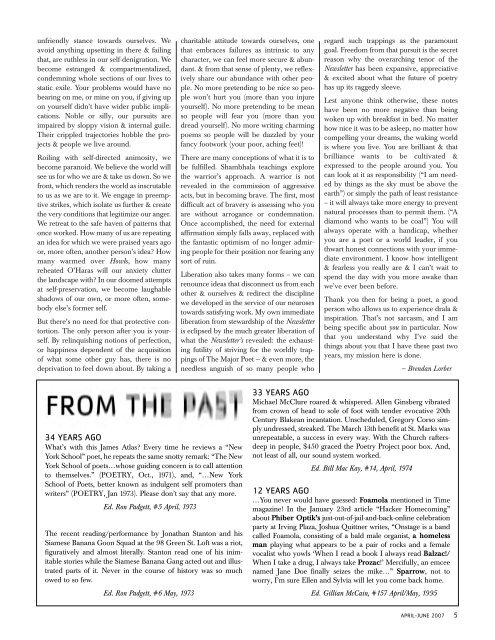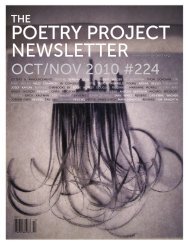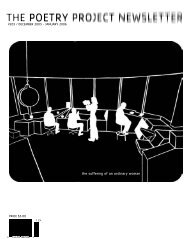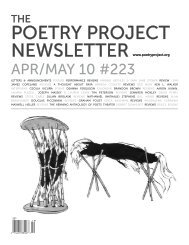You also want an ePaper? Increase the reach of your titles
YUMPU automatically turns print PDFs into web optimized ePapers that Google loves.
unfriendly stance towards ourselves. We<br />
avoid anything upsetting in there & failing<br />
that, are ruthless in our self-denigration. We<br />
become estranged & compartmentalized,<br />
condemning whole sections of our lives to<br />
static exile. Your problems would have no<br />
bearing on me, or mine on you, if giving up<br />
on yourself didn’t have wider public implications.<br />
Noble or silly, our pursuits are<br />
impaired by sloppy vision & internal guile.<br />
<strong>The</strong>ir crippled trajectories hobble the projects<br />
& people we live around.<br />
Roiling with self-directed animosity, we<br />
become paranoid. We believe the world will<br />
see us for who we are & take us down. So we<br />
front, which renders the world as inscrutable<br />
to us as we are to it. We engage in preemptive<br />
strikes, which isolate us further & create<br />
the very conditions that legitimize our anger.<br />
We retreat to the safe haven of patterns that<br />
once worked. How many of us are repeating<br />
an idea for which we were praised years ago<br />
or, more often, another person’s idea How<br />
many warmed over Howls, how many<br />
reheated O’Haras will our anxiety clutter<br />
the landscape with In our doomed attempts<br />
at self-preservation, we become laughable<br />
shadows of our own, or more often, somebody<br />
else’s former self.<br />
But there’s no need for that protective contortion.<br />
<strong>The</strong> only person after you is yourself.<br />
By relinquishing notions of perfection,<br />
or happiness dependent of the acquisition<br />
of what some other guy has, there is no<br />
deprivation to feel down about. By taking a<br />
charitable attitude towards ourselves, one<br />
that embraces failures as intrinsic to any<br />
character, we can feel more secure & abundant.<br />
& from that sense of plenty, we reflexively<br />
share our abundance with other people.<br />
No more pretending to be nice so people<br />
won’t hurt you (more than you injure<br />
yourself). No more pretending to be mean<br />
so people will fear you (more than you<br />
dread yourself). No more writing charming<br />
poems so people will be dazzled by your<br />
fancy footwork (your poor, aching feet)!<br />
<strong>The</strong>re are many conceptions of what it is to<br />
be fulfilled. Shambhala teachings explore<br />
the warrior’s approach. A warrior is not<br />
revealed in the commission of aggressive<br />
acts, but in becoming brave. <strong>The</strong> first, most<br />
difficult act of bravery is assessing who you<br />
are without arrogance or condemnation.<br />
Once accomplished, the need for external<br />
affirmation simply falls away, replaced with<br />
the fantastic optimism of no longer admiring<br />
people for their position nor fearing any<br />
sort of ruin.<br />
Liberation also takes many forms – we can<br />
renounce ideas that disconnect us from each<br />
other & ourselves & redirect the discipline<br />
we developed in the service of our neuroses<br />
towards satisfying work. My own immediate<br />
liberation from stewardship of the Newsletter<br />
is eclipsed by the much greater liberation of<br />
what the Newsletter’s revealed: the exhausting<br />
futility of striving for the worldly trappings<br />
of <strong>The</strong> Major Poet — & even more, the<br />
needless anguish of so many people who<br />
regard such trappings as the paramount<br />
goal. Freedom from that pursuit is the secret<br />
reason why the overarching tenor of the<br />
Newsletter has been expansive, appreciative<br />
& excited about what the future of poetry<br />
has up its raggedy sleeve.<br />
Lest anyone think otherwise, these notes<br />
have been no more negative than being<br />
woken up with breakfast in bed. No matter<br />
how nice it was to be asleep, no matter how<br />
compelling your dreams, the waking world<br />
is where you live. You are brilliant & that<br />
brilliance wants to be cultivated &<br />
expressed to the people around you. You<br />
can look at it as responsibility (“I am needed<br />
by things as the sky must be above the<br />
earth”) or simply the path of least resistance<br />
– it will always take more energy to prevent<br />
natural processes than to permit them. (“A<br />
diamond who wants to be coal”) You will<br />
always operate with a handicap, whether<br />
you are a poet or a world leader, if you<br />
thwart honest connections with your immediate<br />
environment. I know how intelligent<br />
& fearless you really are & I can’t wait to<br />
spend the day with you more awake than<br />
we’ve ever been before.<br />
Thank you then for being a poet, a good<br />
person who allows us to experience drala &<br />
inspiration. That’s not sarcasm, and I am<br />
being specific about you in particular. Now<br />
that you understand why I’ve said the<br />
things about you that I have these past two<br />
years, my mission here is done.<br />
— Brendan Lorber<br />
34 YEARS AGO<br />
What’s with this James Atlas Every time he reviews a “New<br />
York School” poet, he repeats the same snotty remark: “<strong>The</strong> New<br />
York School of poets…whose guiding concern is to call attention<br />
to themselves.” (POETRY, Oct., 1971), and, “…New York<br />
School of Poets, better known as indulgent self promoters than<br />
writers” (POETRY, Jan 1973). Please don’t say that any more.<br />
Ed. Ron Padgett, #5 April, 1973<br />
<strong>The</strong> recent reading/performance by Jonathan Stanton and his<br />
Siamese Banana Goon Squad at the 98 Green St. Loft was a riot,<br />
figuratively and almost literally. Stanton read one of his inimitable<br />
stories while the Siamese Banana Gang acted out and illustrated<br />
parts of it. Never in the course of history was so much<br />
owed to so few.<br />
Ed. Ron Padgett, #6 May, 1973<br />
33 YEARS AGO<br />
Michael McClure roared & whispered. Allen Ginsberg vibrated<br />
from crown of head to sole of foot with tender evocative 20th<br />
Century Blakean incantation. Unscheduled, Gregory Corso simply<br />
undressed, streaked. <strong>The</strong> March 13th benefit at St. Marks was<br />
unrepeatable, a success in every way. With the Church raftersdeep<br />
in people, $450 graced the <strong>Poetry</strong> <strong>Project</strong> poor box. And,<br />
not least of all, our sound system worked.<br />
Ed. Bill Mac Kay, #14, April, 1974<br />
12 YEARS AGO<br />
…You never would have guessed: Foamola mentioned in Time<br />
magazine! In the January 23rd article “Hacker Homecoming”<br />
about Phiber Optik’s just-out-of-jail-and-back-online celebration<br />
party at Irving Plaza, Joshua Quittner writes, “Onstage is a band<br />
called Foamola, consisting of a bald male organist, a homeless<br />
man playing what appears to be a pair of rocks and a female<br />
vocalist who yowls ‘When I read a book I always read Balzac!/<br />
When I take a drug, I always take Prozac!’ Mercifully, an emcee<br />
named Jane Doe finally seizes the mike…” Sparrow, not to<br />
worry, I’m sure Ellen and Sylvia will let you come back home.<br />
Ed. Gillian McCain, #157 April/May, 1995<br />
APRIL-JUNE 2007 5
















